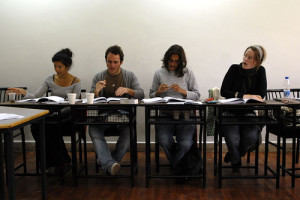
One question I get asked frequently is about the optimal way to learn Arabic. Some people insist that you can’t really become fluent in the language if you don’t attend classes at some university or institute, while others say they don’t need any formal instruction at all.
The initial phase
I can only talk about my own experience and what works best for me when learning a new language. In general, I prefer to spend an initial phase of learning the language on my own, without any tutors, teachers or classes. In this initial phase I can get to know the language through some beginner textbooks designed for self-study. With languages such as Arabic, I can also learn the script during that phase.
Having a teacher correct me or having to listen to other learners in a class make mistakes and botch the pronunciation of the language are only a hindrance to me in acquiring a solid foundation in the language. Especially in the beginning, the speed of progress can be quite different for different learners and I find it frustrating that group instruction cannot account for that.
During the initial period I focus almost exclusively on listening and reading the language, not so much on producing the language myself.
After going through something like an Assimil or Teach Yourself course (or preferably more than one of such courses) in something like three or so months (sometimes longer, sometimes shorter), I am ready to apply my skills in an applied context. This means either going to a country where the language is spoken, signing up for class tuition or hiring a private tutor. Out of the three options, I prefer the first and the third, especially when they can be combined, i.e. a stay in the country where the language is spoken that includes some private tuition.
Disadvantages of Arabic classes
While I do sometimes find it enjoyable to be part of a group of people learning the target language, I feel that there are many drawbacks:
– In a class tuition environment there is only one native speaker and several (sometimes up to 20) non-natives. The largest part of the lesson you will be listening to non-natives speaking the language, making mistakes and using incorrect intonation and pronunciation. Language is largely learned by imitation, so no surprise here that you will be copying the mistakes others make.
– Progress can be too slow or too fast.
– You are required to use language material and discuss topics you might have no interest in whatsoever. For instance, many advanced Arabic classes will discuss Arabic literature and poetry, but what if you simply aren’t interested in those areas, even in your native language?
– Group classes almost always focus on grammar instruction. Don’t get me wrong, direct grammar instruction can be useful, but only in certain specific circumstances. For instance, often Arabic teachers will insist on teaching grammar terminology, e.g. maf3ool bihi, maf3ool fihi etc. But, why do I need to know the name of the grammatical concepts, rather than being able to use them spontaneously through having had enough exposure to them?
– Group classes are often designed to make you dependent on them. What do I mean by that? Well, if you are using a book that mainly consists of exercises and does not provide any solutions, you will have to rely completely on the teacher. On the other hand, using material suitable for self-instruction (i.e. with more texts and solutions for any exercises) can make you independent.
Advantages of Arabic class tuition
Of course, learning Arabic in a class environment has its advantages too:
– It can be fun to meet other like-minded people, who can be a source of motivation.
– It might be informative to measure your own progress against that of your peers.
– Usually, it’s much cheaper than one-on-one tuition.
– You will learn to converse in Arabic with non-natives, developing a tolerance for slightly-off pronunciation and being accommodating to potential grammar mistakes etc.
– At an upper-intermediate or advanced stage, you will likely benefit from discussions about mistakes your class mates make, as you already have a solid foundation and won’t be influenced as easily by the mistakes they make.
Overall, I feel that I profited much more from one-to-one tuition in my Arabic learning and made much quicker progress. More importantly, this form of learning allowed me to be pro-active in my language learning and enable me to include those topics in which I am interested.
What has your experience been learning Arabic (or other languages)?
Did you attend classes, use private tutors or learn by yourself? Which form do you prefer?
Picture credits to joshhough





Back in my school going days I learned two languages in a classroom environment – Irish (I’m from Ireland) and German. I did not achieve fluency in either but got to a pretty good level.
At the moment I’m just beginning to learn Spanish but learning in a completely different way by using an on-line Spanish course. Having experienced both methods of learning I would honestly say that I would not want to go back to taking a language class of any kind.
For me personally the over emphasis on reading and writing in a particular language is what I don’t like about taking a class. With the on-line course I’m using the emphasis is almost entirely on actually speaking the language which is what I’m most interested in!
Joe.
http://therocketspanishreviewer.com/
Thanks for you comment Joe. Yes, reading and writing are the easiest skills to teach in a class environment, which is why they get so much attention from teachers. Good luck with your Spanish learning!